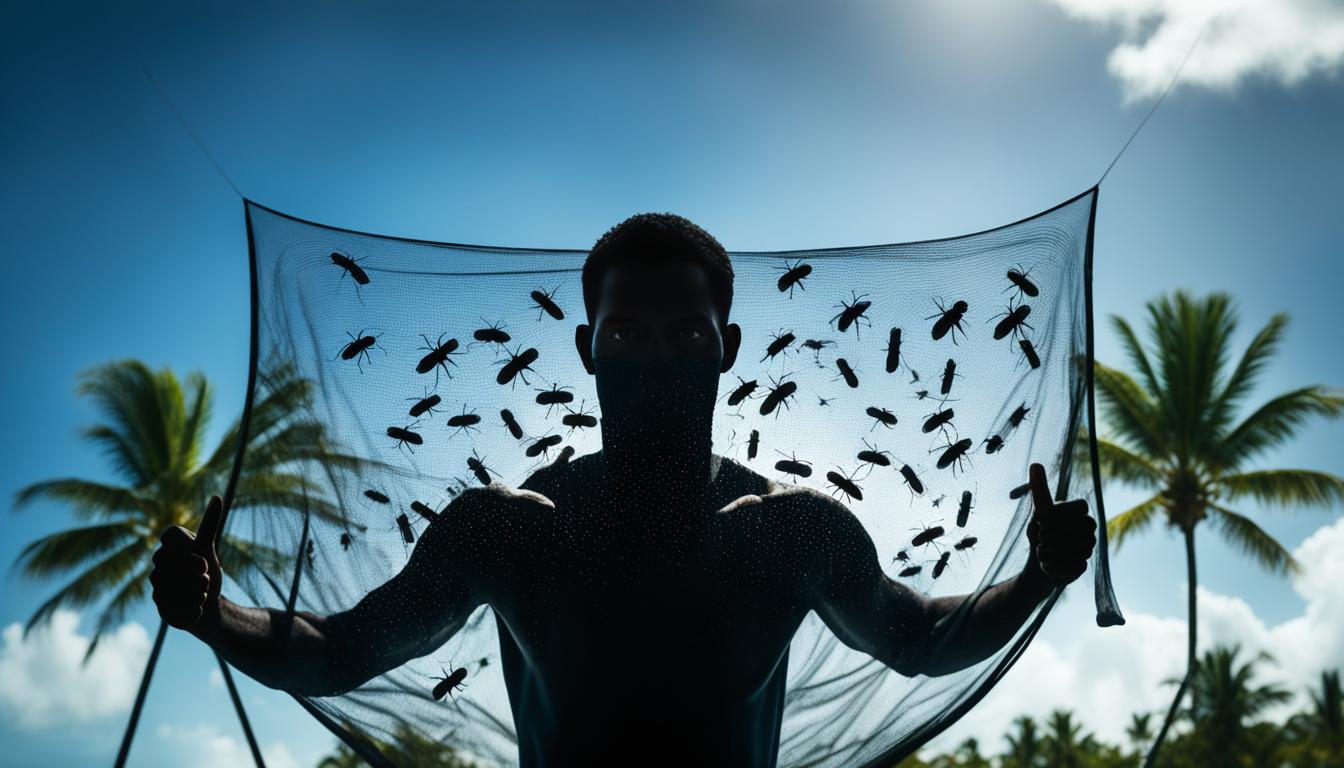Welcome to Punta Cana, a paradise destination known for its stunning beaches and vibrant culture. As you plan your trip, it’s important to stay informed about the latest updates on Zika virus precautions in the area. While there is currently no evidence of an ongoing Zika virus outbreak in Punta Cana, it’s essential to take necessary precautions to protect yourself and others from potential risks.
Zika virus is a mosquito-borne illness that can cause mild symptoms in most people, but it can be especially harmful to pregnant women and their babies. To ensure a safe and worry-free trip, it’s important to be aware of the potential risks and take proactive measures to prevent mosquito bites and reduce your chances of exposure to the virus.
Key Takeaways:
- There is currently no evidence of an ongoing Zika virus outbreak in Punta Cana.
- Take precautions to prevent mosquito bites, especially if you are pregnant or planning a pregnancy in the near future.
- Consult with a healthcare provider for personalized advice before traveling.
- Stay informed about the latest guidelines and recommendations from reputable sources like the CDC.
- Consider postponing travel if necessary.
Infectious Disease Risks in Punta Cana
When planning a trip to Punta Cana, it’s essential to be aware of the various infectious disease risks that you may encounter. While the Zika virus is a concern in the region, it is just one of many potential health hazards. Other vaccine-preventable diseases, such as hepatitis A, can also be present in Punta Cana.
To protect yourself and ensure a safe journey, it is crucial to take necessary precautions. Here are some key points to keep in mind:
- Stay up to date on routine vaccinations, including COVID-19 and seasonal influenza.
- Avoid consuming food sold by informal sellers, as there is a risk of travelers’ diarrhea.
- Be aware that typhoid fever and respiratory infections like COVID-19 and tuberculosis are also present in Punta Cana.
By staying informed and taking appropriate measures, you can minimize the risk of exposure to infectious diseases during your trip.
Travelers to Punta Cana should ensure they are up to date on routine vaccinations, including COVID-19 and seasonal influenza.
It is advisable to consult with a healthcare professional or travel medicine specialist before traveling to Punta Cana. They can provide personalized advice and recommendations based on your specific health needs and travel plans.
Preventing Hepatitis A in Punta Cana
Hepatitis A is a viral infection that can cause inflammation of the liver. It is primarily spread through contaminated food and water. To protect yourself from hepatitis A while in Punta Cana, follow these guidelines:
- Practice good hand hygiene by washing your hands with soap and water frequently, especially before eating.
- Avoid consuming raw or undercooked seafood, as well as uncooked fruits and vegetables that may have been washed with contaminated water.
- Drink bottled or boiled water, and avoid ice cubes and drinks made with tap water.
- Ensure that any food you consume is properly cooked and served hot.
- Consider getting vaccinated against hepatitis A before your trip.
By taking these preventive measures, you can reduce the risk of contracting hepatitis A and enjoy a worry-free vacation in Punta Cana.
Mosquito-Borne Diseases in Punta Cana
Aside from the Zika virus, Punta Cana is also at risk for other mosquito-borne diseases such as dengue fever and chikungunya. To protect yourself from mosquito bites and the potential transmission of these diseases, follow these recommendations:
- Apply insect repellents that contain DEET, picaridin, or other recommended ingredients to exposed skin and clothing.
- Wear long-sleeved shirts, long pants, socks, and closed-toe shoes to cover your skin as much as possible.
- Stay in accommodations with proper screens on windows and doors, or choose accommodations with air conditioning.
- Avoid outdoor activities or take extra precautions during peak mosquito biting hours, typically sunrise and sunset.
Remember, prevention is key when it comes to mosquito-borne diseases. Taking these precautions will help minimize your risk of exposure during your stay in Punta Cana.
| Disease | Symptoms | Prevention |
|---|---|---|
| Zika Virus | Asymptomatic or mild fever, headache, muscle/joint pain, rash |
|
| Dengue Fever | Fever, severe headache, joint/muscle pain, rash |
|
| Chikungunya | Fever, joint pain, headache, rash |
|
Preventing Zika Virus in Punta Cana
To prevent Zika virus in Punta Cana, there are several crucial measures you should take. By following these precautions, you can minimize the risk of exposure and enjoy a safe and worry-free trip:
1. Protect Yourself from Mosquito Bites
One of the most effective ways to prevent Zika virus is to avoid mosquito bites. Here’s what you can do:
- Wear long-sleeved clothing and long pants to minimize exposed skin.
- Use insect repellent containing DEET, picaridin, or oil of lemon eucalyptus, applying it to all exposed areas of your skin.
- Stay in accommodations with properly fitted screens on windows and doors or opt for air-conditioned rooms.
2. Practice Safe Sexual Behavior
Zika virus can be sexually transmitted, so it’s essential to take precautions if you or your partner may have been exposed to the virus. Consider the following:
- Use condoms consistently and correctly during sexual intercourse.
- If you or your partner are pregnant or planning a pregnancy, consult with a healthcare provider for personalized advice on safe sexual practices.
3. Consult with a Healthcare Provider
If you are pregnant or planning a pregnancy in the near future, it is important to seek guidance from a healthcare provider before traveling to Punta Cana. They can provide personalized advice and recommendations based on your specific circumstances.
Remember, taking these preventive measures will significantly reduce your risk of contracting Zika virus in Punta Cana, ensuring a safe and enjoyable trip.

| Preventive Measures | Description |
|---|---|
| Wear protective clothing | Long-sleeved shirts, long pants, and hats can help reduce exposure to mosquitoes. |
| Use insect repellent | Apply a repellent containing DEET, picaridin, or oil of lemon eucalyptus to exposed skin. |
| Stay in screened or air-conditioned accommodations | Choose accommodations with properly fitted screens on windows and doors, or opt for air-conditioned rooms. |
| Practice safe sex | Consistently and correctly use condoms during sexual intercourse, especially if you or your partner may have been exposed to Zika virus. |
| Consult with a healthcare provider | If you are pregnant or planning a pregnancy, seek personalized advice from a healthcare provider before traveling to Punta Cana. |
Symptoms and Risks of Zika Virus
Zika virus infection can be a silent threat, as many individuals who are infected may not display any symptoms. However, for those who do experience symptoms, they may include:
- Mild fever
- Headache
- Muscle and joint pain
- Nausea
- Vomiting
- Skin rash
Pregnant women should be particularly cautious, as Zika virus can be transmitted to the fetus and lead to birth defects. If you are pregnant or planning a pregnancy, it is crucial to be aware of the risks and take appropriate precautions.
If you experience any of these symptoms, especially if you are pregnant or planning a pregnancy, seeking medical attention is essential. Early diagnosis and appropriate care can help manage the virus’s impact on your health and the health of your baby.
«Zika virus infection can be challenging to detect due to its often asymptomatic nature. However, it is crucial for pregnant women and those planning to become pregnant to stay vigilant and seek medical guidance if any symptoms arise.»
| Risks | Impacted Population |
|---|---|
| Developmental abnormalities in fetuses | Pregnant women |
| Mild flu-like symptoms | General population |
Zika Virus Guidelines for Traveling to Punta Cana
The Centers for Disease Control and Prevention (CDC) has provided guidelines for travelers visiting areas with a risk of Zika virus, including Punta Cana. It is important to follow these guidelines to ensure a safe and healthy trip. The guidelines include:
-
Take precautions to prevent mosquito bites:
- Apply insect repellent containing DEET or picaridin to exposed skin.
- Wear long-sleeved shirts and pants, especially during dawn and dusk when mosquitoes are most active.
- Stay in accommodations with screened windows and doors, or air conditioning.
-
Practice safe sex or abstain from sexual intercourse:
- Use condoms consistently and correctly, or abstain from sexual activity throughout the trip.
- It is important to note that Zika virus can be sexually transmitted, even from individuals who are asymptomatic.
-
Seek medical advice before and after travel:
- Consult with a healthcare provider to assess your individual risk and determine appropriate preventive measures.
- Additionally, seek medical attention if you experience any symptoms associated with Zika virus, such as fever, rash, joint pain, or red eyes.
-
Pregnant women should consider postponing travel to areas with a risk of Zika virus transmission:
- Zika virus can cause birth defects and developmental issues in unborn babies.
- If you are pregnant or planning a pregnancy, it is crucial to discuss your travel plans with your healthcare provider.
Summary of Zika Virus Guidelines for Traveling to Punta Cana
| Guidelines | Details |
|---|---|
| Prevent Mosquito Bites | Apply insect repellent, wear long-sleeved clothing, and stay in accommodations with proper screens or air conditioning. |
| Practice Safe Sex | Use condoms or abstain from sexual intercourse to reduce the risk of sexual transmission of Zika virus. |
| Seek Medical Advice | Consult with a healthcare provider before and after travel for personalized advice and to address any symptoms. |
| Consider Postponing Travel for Pregnant Women | Pregnant women should discuss travel plans with their healthcare provider due to the risk of birth defects. |

Remember to stay informed about the latest guidelines and recommendations from credible sources, such as the CDC. By following these guidelines and taking necessary precautions, you can minimize your risk of Zika virus transmission and ensure a safe and enjoyable trip to Punta Cana.
Other Vectorborne Diseases in Punta Cana
In addition to the concerns surrounding Zika virus, Punta Cana is also at risk for other vectorborne diseases. Two notable examples are dengue fever and malaria.
Dengue Fever
Dengue fever is widespread in the Dominican Republic, including Punta Cana. Each year, thousands of cases are reported, making it a significant health risk for travelers.
Dengue fever is transmitted by the Aedes mosquito, which is also responsible for spreading Zika virus. The symptoms of dengue fever can range from mild to severe and may include high fever, severe headache, joint and muscle pain, rash, and fatigue.
To reduce the risk of contracting dengue fever, it is important to take precautions to prevent mosquito bites. This includes using insect repellent, wearing protective clothing (such as long-sleeved shirts and long pants), and staying in accommodations with proper screens or air conditioning to keep mosquitoes out.
Malaria
Malaria is endemic to certain provinces in the Dominican Republic, including the resort areas of Bávaro and Punta Cana. While the overall risk of malaria in these areas is low, it is still important to take precautions.
Malaria is transmitted by the Anopheles mosquito and can cause severe illness if left untreated. Symptoms of malaria may include fever, headache, chills, and flu-like symptoms.
Travelers to areas with a risk of malaria, including Punta Cana, should take malaria prophylaxis (preventive medication) as recommended by their healthcare provider. In addition, it is essential to protect against mosquito bites by using insect repellent, wearing protective clothing, and sleeping under mosquito nets if accommodations do not have proper screens or air conditioning.
Regarding the risk of other vectorborne diseases in Punta Cana, preventive measures should be taken to avoid mosquito bites and reduce the risk of transmission. Be sure to consult with a healthcare provider and take necessary precautions before and during your trip.
Leptospirosis and Soil- & Waterborne Infections
Punta Cana is known for its beautiful landscapes and recreational activities, but it’s important to be aware of certain health risks in the area. Leptospirosis, a bacterial infection, is prevalent in Punta Cana, with cases reported annually. This infection can be contracted through contact with water contaminated with animal urine, which is often found in lakes and rivers.
To reduce your risk of leptospirosis and other soil- and waterborne infections, it’s advisable to avoid recreational activities in lakes and rivers during your stay in Punta Cana. These water sources may be contaminated due to factors such as heavy rainfall, flooding, and poor sanitation practices. By practicing good hygiene and avoiding exposure to potentially contaminated water sources, you can help protect yourself.
Preventive Measures for Leptospirosis and Soil- & Waterborne Infections
- Avoid swimming or engaging in water activities in lakes and rivers.
- Follow local health advisories and warnings regarding water safety.
- Practice good hygiene, such as washing your hands with soap and clean water regularly.
- Stay informed about the latest updates on health risks in Punta Cana.
It’s important to note that these preventive measures are essential not only for leptospirosis but also for other soil- and waterborne infections. By being cautious and taking necessary precautions, you can enjoy your time in Punta Cana while minimizing your risk of exposure to these health hazards.
Remember, while visiting Punta Cana, it’s essential to prioritize your health and well-being. By staying informed and following the recommended preventive measures, you can have a safer and more enjoyable experience in this beautiful destination.
Animal Bites & Rabies in Punta Cana
Rabies, a viral disease that affects the central nervous system, poses a risk in Punta Cana. While sporadic cases of animal rabies have been reported, it is crucial for travelers to take precautions to minimize the risk of animal bites and potential exposure to this deadly virus.
To protect yourself, it is important to avoid petting or playing with animals, especially strays, as they may carry rabies. Even seemingly friendly animals can transmit the virus through bites or scratches. Remember, it’s better to admire animals from a safe distance rather than risk an encounter that could have serious consequences.
If you do happen to sustain an animal bite or scratch, seeking immediate medical attention is essential. Rabies postexposure prophylaxis, a series of vaccines, can prevent the virus from causing illness if administered promptly. It is crucial to visit specialized or regional hospitals where this treatment is readily available.
By being cautious and following these preventive measures, you can minimize the risk of contracting rabies during your stay in Punta Cana.
Rabies Prevention Tips:
- Avoid petting or playing with animals, especially strays.
- Do not approach animals showing signs of aggression or unusual behavior.
- If you are bitten or scratched by an animal, wash the wound thoroughly with soap and water for at least 15 minutes.
- Seek immediate medical attention and inform the healthcare provider about the incident and your travel history.
- Follow the healthcare provider’s advice on receiving rabies postexposure prophylaxis.
Remember, your safety is paramount, so always take precautionary measures to protect yourself from potential risks.
Climate & Sun Exposure in Punta Cana
Punta Cana boasts a tropical climate that offers warm temperatures throughout the year. However, along with the sunny paradise comes the need to protect yourself from the strong sun exposure and high humidity. These factors can pose potential risks to your health during your stay in this beautiful destination.
To ensure a safe and comfortable trip, it is crucial to take adequate precautions against sun exposure. Protecting your skin from the harmful UV rays is essential, as overexposure can lead to sunburn, premature aging, and an increased risk of skin cancer.
Here are some tips to help you prevent sun-related issues and enjoy your time in Punta Cana:
- Wear protective clothing: When heading out under the sun, wear hats, sunglasses, and loose-fitting long-sleeved shirts and pants to shield your skin from direct sunlight.
- Apply sunscreen: Use a broad-spectrum sunscreen with a high sun protection factor (SPF) of 30 or higher. Apply it generously on all exposed skin, reapplying every two hours or more frequently if you swim or sweat.
- Seek shade: Take breaks from the direct sun by staying in shaded areas, using umbrellas, or seeking shelter indoors, especially during peak sun hours between 10 a.m. and 4 p.m.
- Stay hydrated: The high humidity in Punta Cana can contribute to dehydration. Drink plenty of hydrating fluids, such as water and electrolyte-rich beverages, to stay cool and maintain optimal hydration levels.
- Protect your eyes: Proper eye protection is crucial in sunny environments. Wear sunglasses with UV protection to shield your eyes from harmful rays.
By following these sun protection measures, you can minimize the risks associated with prolonged sun exposure and enjoy your time in Punta Cana without compromising your health.
Remember that while enjoying the sunny weather, it’s equally important to stay hydrated and take breaks from direct sun exposure to keep your body and skin healthy during your vacation.
Toxic Exposures in Punta Cana
When traveling to Punta Cana, it’s important to be aware of potential toxic exposures that can pose health risks. One such concern is methanol poisoning, which has been reported in the area. To protect yourself, it’s crucial to exercise caution when consuming alcoholic beverages and ensure they are from reputable sources.
To avoid toxic exposures in Punta Cana:
- Be cautious when consuming alcoholic beverages. Make sure to purchase drinks from reputable establishments to minimize the risk of contamination or adulteration.
- Choose trusted sources. Opt for well-known brands and establishments that prioritize safety and quality control.
- Inspect the appearance and smell. Methanol-contaminated drinks may have unusual colors, off-putting odors, or strange tastes.
- Trust your instincts. If something feels off or suspicious about a drink, it’s better to err on the side of caution and avoid consuming it.
By being mindful of these precautions, you can help protect yourself from toxic exposures in Punta Cana and ensure a safe and enjoyable trip.
«While enjoying your time in Punta Cana, it’s essential to be vigilant about the beverages you consume. Stick to reputable sources and trust your instincts if something seems off.»
Signs of Methanol-Contaminated Drinks
| Signs | Description |
|---|---|
| Unusual colors | Drinks may have a strange tint, such as blue, green, or unusually dark hues. |
| Off-putting odors | Contaminated beverages can emit strong or unpleasant smells. |
| Strange tastes | Methanol-contaminated drinks may have a bitter, chemical, or unusual flavor. |
Remember, safeguarding your well-being should always be a top priority while exploring Punta Cana. Following these guidelines can mitigate the risk of toxic exposures and ensure a safe and enjoyable experience.
Safety & Security in Punta Cana
Like any destination, safety and security are important considerations when traveling to Punta Cana. By taking necessary precautions, you can ensure a safe and enjoyable trip. Here are some guidelines to follow:
1. Be aware of your surroundings: Pay attention to your surroundings, especially in crowded areas. Stay alert and vigilant, keeping an eye out for any suspicious activities.
2. Protect yourself and your belongings: Take necessary precautions to protect yourself and your belongings from theft or robbery. Keep your valuables secure and avoid displaying expensive items. Use hotel safes or lockers to store important documents and valuables.
3. Travel in groups: Whenever possible, travel in groups, particularly at night or in unfamiliar areas. There is safety in numbers, and being with others can help deter potential threats.
4. Use licensed taxi drivers: When using transportation services, such as taxis, make sure to use licensed drivers. Avoid getting into unmarked or unofficial vehicles.
5. Be cautious of strangers: Exercise caution when interacting with strangers. Avoid sharing personal information or revealing your travel plans to individuals you do not know well.
6. Follow local laws and regulations: Familiarize yourself with the local laws and regulations of Punta Cana. Respect the local customs and traditions, and obey any rules or restrictions that are in place.
«Your safety is our top priority. By following these safety precautions, you can have a worry-free trip to Punta Cana and enjoy everything this beautiful destination has to offer.»
Traffic-Related Injuries in Punta Cana
Traffic-related injuries pose a significant risk in Punta Cana, with a high number of traffic deaths per capita. It’s crucial for travelers to prioritize their safety by exercising caution when driving or using transportation services and adhering to local traffic laws. By adopting responsible habits, you can minimize the chances of accidents and ensure a secure travel experience in Punta Cana.
Key Safety Tips to Prevent Traffic-Related Injuries:
- Always wear your seatbelt while inside a vehicle to protect yourself in case of an accident.
- If you plan to ride a motorcycle or bicycle, wear a helmet to safeguard your head in the event of a crash.
- Avoid using motorcycle taxis, as they often lack adequate safety measures and may expose you to unnecessary risks.
- Stay vigilant and observe local traffic laws, signals, and signs when driving or crossing the road.
- Be mindful of pedestrians, especially in highly populated areas, and yield to them when necessary.
Remember, promoting safe driving practices is paramount to your well-being while exploring Punta Cana. Take every precaution to protect yourself and others on the road, ensuring a secure and enjoyable vacation experience.
«Safety on the roads shouldn’t be taken lightly. By following traffic regulations and staying alert, you can help reduce the risk of accidents and ensure a safe journey in Punta Cana.»
| Number of Traffic-Related Deaths (per 100,000 population) | |
|---|---|
| Punta Cana | XX.XX |
| National Average | XX.XX |
Conclusion
When planning a trip to Punta Cana, it’s crucial to be aware of the potential health risks, including the Zika virus. By taking necessary precautions and following safety guidelines, you can minimize your risk of exposure to infectious diseases and other hazards.
To prevent the Zika virus, make sure to prevent mosquito bites by wearing long-sleeved clothing, using insect repellent, and staying in accommodations with proper screens or air conditioning. If you or your partner may have been exposed to the virus, consider using condoms or abstaining from sexual intercourse.
Stay informed about the latest updates and recommendations from reliable sources like the CDC to ensure a safe and worry-free trip. By staying vigilant and taking the necessary steps, you can enjoy all that Punta Cana has to offer while keeping yourself protected.
FAQ
Are there any ongoing Zika virus outbreaks in Punta Cana?
Currently, there is no evidence of an ongoing Zika virus outbreak in Punta Cana. However, it is important to note that there is limited information available, and new cases may be delayed in detection and reporting.
Should pregnant women take any precautions when traveling to Punta Cana?
Yes, pregnant women or those planning a pregnancy in the near future should take precautions to prevent mosquito bites. It is advisable to consult with a healthcare provider for personalized advice and consider postponing travel if necessary.
Are there any other infectious disease risks in Punta Cana?
Yes, Punta Cana is at risk for other vaccine-preventable diseases, such as hepatitis A. Travelers should ensure they are up to date on routine vaccinations, including COVID-19 and seasonal influenza. Other risks include travelers’ diarrhea, typhoid fever, and respiratory infections like COVID-19 and tuberculosis.
How can I prevent Zika virus in Punta Cana?
To prevent Zika virus, it is important to take measures to avoid mosquito bites. This includes wearing long-sleeved clothing, using insect repellent, and staying in accommodations with proper screens or air conditioning. Pregnant women or those planning a pregnancy should take extra precautions and consult with a healthcare provider for personalized advice.
What are the symptoms and risks of Zika virus?
Zika virus infection is often asymptomatic, but those who do develop symptoms may experience mild fever, headache, muscle and joint pain, nausea, vomiting, and a skin rash. Zika virus is of particular concern for pregnant women, as it can be transmitted to the fetus and cause birth defects.
Are there any guidelines for traveling to Punta Cana with regard to Zika virus?
The Centers for Disease Control and Prevention (CDC) provides guidelines for travelers visiting areas with a risk of Zika virus, including Punta Cana. These guidelines include taking precautions to prevent mosquito bites, practicing safe sex, and seeking medical advice before and after travel. Pregnant women should consider postponing travel to areas with a risk of Zika virus transmission.
Are there any other vectorborne diseases in Punta Cana?
Yes, Punta Cana is also at risk for other vectorborne diseases, such as dengue and malaria. Dengue is widespread in the Dominican Republic, and travelers should take precautions to prevent mosquito bites. Malaria is endemic to certain provinces, including the resort areas of Bávaro and Punta Cana, and travelers should take malaria prophylaxis and use precautions to prevent mosquito bites.
What other infections should I be aware of in Punta Cana?
Leptospirosis and other soil- and waterborne infections are a concern in Punta Cana, due to factors such as heavy rainfall, flooding, and poor sanitation practices. Travelers should practice good hygiene and avoid exposure to potentially contaminated water sources.
Is rabies a concern in Punta Cana?
Yes, rabies is a concern in Punta Cana, with sporadic cases of animal rabies reported. Travelers should avoid petting or playing with animals and seek medical attention if bitten or scratched. Pre-exposure and post-exposure rabies prophylaxis are available in specialized and regional hospitals.
What precautions should I take for sun exposure in Punta Cana?
Punta Cana has a tropical climate with strong sun exposure. Travelers should take precautions to protect themselves from the sun, such as wearing hats, suitable clothing, and sunscreen with a high SPF. It is also important to stay hydrated to prevent dehydration.
Are there any toxic exposures to be aware of in Punta Cana?
Yes, toxic exposures, such as methanol poisoning, have been reported in Punta Cana. Travelers should be cautious when consuming alcoholic beverages and ensure they are from reputable sources. It is important to be aware of the potential risks and take appropriate precautions to avoid toxic exposures.
Are there any safety and security concerns in Punta Cana?
Like any destination, Punta Cana has safety and security concerns. Travelers should be cautious of their surroundings, especially in crowded areas, and take necessary precautions to protect themselves and their belongings from theft or robbery. Following normal safety precautions, such as traveling in groups and using licensed taxi drivers, is advisable.
What should I know about traffic-related injuries in Punta Cana?
Traffic-related injuries are a significant concern in Punta Cana, with a high number of traffic deaths per capita. Travelers should exercise caution when driving or using transportation services and follow local traffic laws. It is important to wear seatbelts or helmets and avoid using motorcycle taxis without proper safety measures.
How can I stay safe while traveling to Punta Cana?
Traveling to Punta Cana requires awareness of potential health risks, including Zika virus. By taking necessary precautions like preventing mosquito bites, practicing safe sex, and following general safety guidelines, travelers can help minimize their risk of exposure to infectious diseases and other hazards.




